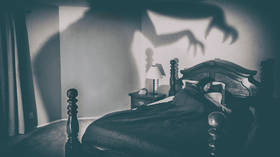Russians told how not to fall victim to ‘old hag’ syndrome

Stress and depression could trigger a condition known as “old hag” syndrome, or sleep paralysis, a Russian psychotherapist and somnologist Elena Kolesnichenko warned on Thursday.
In an interview with Moscow 24, Kolesnichenko explained that sometimes a person wakes up without being able to move or speak. This borderline state often provokes a sense of horror and hopelessness, feeling of physical pressure or the presence of a stranger in the room.
“Dream images are woven into reality. In most cases, they are frightening: mythical creatures, monsters. Because of this mystical effect, sleep paralysis is also called the ‘old hag’ syndrome,” the somnologist said.
Sleep paralysis lasts between a few seconds and two minutes, and is normally harmless, Kolesnichenko said. In rare cases, however, the condition might be related to psychological disorders.
“Sleep paralysis can be triggered by stress and depression. The risk also increases in those who often overwork and who have disrupted sleeping patterns. It is known that those who sleep on their back are more likely to experience the syndrome,” she said.
Smoking, consuming alcohol and drugs can also contribute to the development of the ‘old hag’ syndrome, the physician added.
Therefore, in Kolesnichenko’s opinion, a proper daily routine, absence of bad habits and stress reduction are key in preventing the condition.
“If a frightening episode has happened, you should remember that it will end soon. Also try to ‘turn on’ the muscles: rotate your eyes, move your tongue, toes and hands,” the sonologist advised.
According to the website of the UK National Health Service (NHS), sleep paralysis can also occur when a person is falling asleep. Most people will only get it “once or twice in their life,” the NHS says.
An unusual nickname of the condition, meanwhile, comes not only from the nightmare visions people are getting. The ‘old hag’ expression reportedly originated in Newfoundland, Canada, where people associated the feeling of pressure, typical for sleep paralysis, with a witch-like creature perching on the chest. Descriptions of the frightening experience can be found in folklore traditions across the world. In Nigeria, people believed that a demon-woman attacks you during a sleep and renders motionless, and in Japan the phenomenon was linked to a vengeful spirit seeking to strangle a sleeping person.













